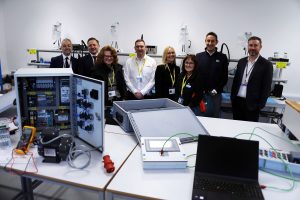Funding provided for new partnership to boost graphene production

The University of Birmingham has partnered with Parsagraf, backed by £3.4m in funding, to scale up graphene production and explore its use in quantum computing sensors.
Led by Dr Matt Coak from the School of Physics and Astronomy, the research fuelled by £1.4m from Innovate UK and a £2m UKRI Future Leaders Fellowship award, aims to drive commercial development in graphene technology.
The collaboration focuses on graphene magnetic sensors, which could play a key role in future quantum computers.
Dr Coak said: “Cryogenic testing of real, practical, graphene devices has not been carried out before, and their properties at ultra-low temperatures, in the realm of truly quantum behaviour, are largely unknown.
“The School of Physics and Astronomy is carrying out systematic testing at high and low temperatures of graphene magnetic field sensors for use in quantum computers and the charging and battery management circuitry of electric cars. We are additionally probing the fundamental quantum physics inside these single sheets of atoms and seeking to construct detailed theoretical models to describe their electronic behaviour.”
Simon Thomas, co-founder and CEO of Paragraf said: “The future of electronics lies in the adoption of advanced materials. Scaling up our production of real-world devices that are prepared to solve significant problems in quantum computing, battery management, agritech, molecular sensing and many other arenas is a major step towards sustainably realising that future. And the fact that we can do this here in the UK means that the country stands to lead the advanced materials revolution.”









